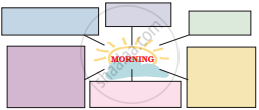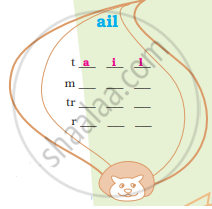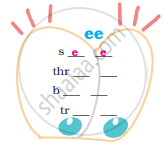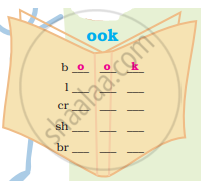Advertisements
Advertisements
प्रश्न
Transform the following sentence as per the given instruction.
The old woman said to Arun, “Can you help me to cross the street?”
(Begin: The old woman asked Arun……………….)
उत्तर
The old woman asked Arun if he could help her cross the street.
संबंधित प्रश्न
Does the poet use the literary devices in the poem?
Why does the poet use repletion in the poem?
Why does the poet use repetition in the poem?
How does the poet describe the flowers by using personification?
What bells are being referred to here? Why are they rung?
Do you think the title of the poem is justified? How?
Who won the race as described in the end.
As soon as the sports meet ended, the children ran on the field. (Begin: Hardly ……………)
Choose two of the passages (a) to (c) and answer briefly the questions that follow:
Raina :
Come away from the window (She takes him firmly back to the middle of the room. The moment she releases him he turns mechanically towards the window again. She seizes him and turns him back, exclaiming) Please! (He becomes motionless, like a hypnotized rabbit, his fatigue gaining fast on him. She releases him, and addresses him patronizingly). Now listen. You must trust to our hospitality. You do not yet know in whose house you are. I am a Petkoff.
The Man: A pet what?
Raina : [rather indignantly] I mean that I belong to the family of the Petkoffs, the richest and best known in our country.
The Man: Oh yes, of course. I beg your pardon. The Petkoffs, to be sure. How stupid of me!
Raina: You know you never heard of them until this moment. How can you stoop to pretend!
The Man: Forgive me. I'm too tired to think, and the change of subject was too much for me. Don't scold me.
(i) Why did the man keep turning to the window?
(ii) Which examples of the social superiority of the Petkoff's does Raina give the man?
(iii) Which opera does Raina mention? With whom does she compare herself? What does this tell you about her?
(iv) In Raina's opinion, what should the man have done instead of threatening her?
(v) What does the man tell Raina about his father? Why does he do so?
(vi) What does the man do at the end of the scene?
This book runs________a hundred and fifty pages.
Fill in the blank with an appropriate word:
I could not accompany my cousin _________ the trip because I had a fever.
Answer the following questions with reference to Ray Douglas Bradbury’s short story, ‘All Summer in a Day’:
Why was there so much excitement in the schoolroom that morning? What sets Margot apart from the other children?
Talk with your family members about elderly people who you have been intimately connected with and who are not there with you now.
Write a short description of someone you liked a lot.
What do you like the most about the poem?
Find out the correlates of Yin and Yang in other cultures.
Locate the following words in the text and study their connotation.
1. gripped the imagination of
2. dawned upon
3. ushered in
4. passed into current coin
5. passport of the future
Comment on the attitude shown by Taplow towards Crocker-Harris.
Which do you think are the most poetic lines? Why?
Approval from the outside world and approval within the family.
How does the narrator bring out the contrast between the Indian way of life and American society? Do you think his wife Mala adjusted comfortably to the new way of life?
Go to your college library and collect and read the poems written by Sarojini Naidu.
Rewrite the following incomplete sentences carefully, so that the reader does not have to guess what is left out.
1. more and more books
2. too difficult
3. got up late, missed the bus
4. solved the mystery
State whether the following statement is true or false. Correct the false statement.
There is nothing wrong with being grateful to great men.
Write your views/opinions in brief on the following topic.
Steps to be taken to eradicate inequality.
Column A shows your involvement in growing a tree, as well as the stages in the life of a tree. Column B shows the feelings you experience at all stages. Match them appropriately.
| A | B | ||
| 1. | You planted a sapling. | a. | Gave you a feeling of joy to see the promising future. |
| 2. | You watered the plant. | b. | The new experience brought excitement to you. |
| 3. | You saw the shoot for the first time. | c. | You were happy and satisfied because you experienced what you had often heard, that a small beginning can lead to great achievements. |
| 4. | You fenced the plant. | d. | The colour, symbolizing life, gave you a feeling of hope. |
| 5. | The plant gradually saw lush green leaves grow on it. | e. | You wanted to make a humble beginning. |
| 6. | The tree had buds too. | f. | Your motive was to protect it. |
| 7. | Birds made a nest on the tree which was fully grown and laden with flowers. | g. | You cared for it. |
The poet has described two different shades of human feelings by using imagery of various forces of Nature in the poem. Pick out the terms or phrases that describe them. Complete the table given below. One is done for you.
| Nature | Feelings |
| Faded forests | Sad/gloomy |
Use the following points and write an appreciation of the poem:
- About the poem, poet, and title
- Theme
- Poetic style, language, poetic devices used in the poem
- Special features
- Message/values/morals in the poem
- Your opinion about the poem
Compose two lines of your own on any sensory organ.
Give suggestions to protect our national heritage monuments.
Prepare a poster on the need for the conservation of the Great Indian Bustard.
Complete the following sentences.
The factors that have made 'The Jungle Book' a great movie are - _________________.
- It's a fantasy world of wonder.
- _____________________________
- _____________________________
- _____________________________
Write what you think about the following thoughts and actions of Mathilde :
Mathilde returned the diamond necklace to her friend.
Gather information on any one of the following by talking to your elders, family members, and from other sources in your mother tongue and write a short note on it in English.
Something that you use to decorate your home on special occasions.
Think and write in your own words.
If you were in the traveller’s place, which road would you choose? Justify your choice.
Answer the following question :
How does fear lead us to error?
Discuss with your friend/brother /sister / your classmate and write your list of wishes to make your village/town/city people happy. You can use the following words.
- great
- wish
- share
- talk
- help
- cooperate
- communicate
Prepare and present a short speech on the following.
An inspiring incident in the life of a great leader.
Find more topics from your Environmental Studies or Mathematics textbooks for drawing tree diagrams. Draw and label the diagrams.
| Life on earth began with unicellular I organisms known as protozoa. The following are the stages of evolution of animals. Invertebrates are animals without a backbone, for e.g., a snail. The vertebrates are animals which have a backbone. E.g., Aquatic animals like fish. Animals which: live in water and also on land are called amphibians. E.g. A frog. A few invertebrates are worms and mosquitoes and a few I vertebrates are reptiles. |
Create a Personal Particular for your class with support from your teacher and collect personal and educational information.
Go through the following steps and discuss in pairs about the facts mentioned in it. Write a paragraph using the points. Give another interesting title.
| Living A Better Life |
| ↓ |
| Get rid of one bad habit at a time. |
| ↓ |
| Avoid negative thoughts. Be positive. |
| ↓ |
| Trust yourself. Love what you do. |
| ↓ |
| Try to enrich your mind by becoming a life long learner. |
| ↓ |
| Sharing and Caring makes life enjoyable. |
| ↓ |
| Be humble. Respect and welcome/accept each day with a smile. |
Write a short paragraph describing the life and work of Mary Kom. Take help of the points given below.
- Early life
- Training
- Achievements
- Future plans
Arrange the jumbled sentences and write a paragraph. Use appropriate conjunctions.
Jane Eyre is an orphan.
She lives with her aunt Mrs. Reed.
Mrs. Reed does not like Jane because Jane is not her daughter.
Jane’s uncle Mr. Reed likes Jane, but he dies.
He makes Mrs. Reed promise to take care of Jane, but instead she sends Jane away.
Jane is ten years old, she is sent to Lowood school.
Jane graduates and stays there to teach.
She leaves for Thornfield, where she is a governess.
She is very happy there.
Read the acrostic poem on ‘Friend’. Write an acrostic poem like this on ‘Tree’.
| Friend | Tree |
|
Friends always love each other |
T |
|
Respect each Other |
R |
|
Interact with each other |
E |
|
Enjoy playing with each Other |
E |
|
Never hurt your friends |
|
|
Do everything together |
______ do you play?
______ do you get up?
Here is a word, morning. Now write down words related to it.

This is Rajiv’s family. They are a healthy family. See what each one does to remain healthy.

Words like morning, evening, watering end in ing. Write six more words to which ing can be added at the end to form a new word.
- ______.
- ______.
- ______
- ______.
- ______
- ______.
Make word families. The first word in each has been written for you.




Which country would you like to visit when you grow up?
Make a project by drawing or pasting.
- a map of that country, its national flag
- stamps of the country, its currency
- some famous monuments or landmarks
The girl looked up at the ______of stars.
The girl slept ______ [sound]
What was the daily routine of the grandmother at home?
How did the grandmother spend the last few hours of her life?
What do you expect your close friends to do for you? Beautify the petals with your thoughts.

We have heard of the proverb ‘Familiarity breeds contempt. Do you think that the passage of time strengthens friendship? Share your reasons with your class.
Describe Mary Kom’s personal experiences during her first International Championship match from the time of selection to winning the medal.
Rearrange the sentences given below and write a summary of the story in a paragraph. Begin with:
Philip Sletherby was travelling by train to Brill Manor.
- The young man introduced himself as Bertie, the son of Saltpen Jago.
- Bertie needed three pounds desperately and asked Sletherby to lend it to him.
- All the time Sletherby was gazing at the door panel of the car, on which were the two crests – a demi-lion and a greyhound courant.
- He was received by Claude People. K.C., who had kept on talking about various things.
- Bertie had left his purse behind, after sealing an envelope with the crest on the purse.
- Bertie stated that it was the Jago crest. He further added that his mother’s hair was dark brown similar to his.
- While describing the appearance of Honario Saltpen-Jago, K.C. referred to her altered hairstyle.
- Sletherby realized that Bertie had not lied to him, but that he had mistaken him for fraud.
- He explained that the Saltpen crest was that of a demi-lion.
- Sletherby sat dumbstruck on learning that Mrs. Honario Saltpen Jago had changed her dark brown hair to a blonde, just five weeks ago.
- Sletherby pointed out to him that his mother’s letter had a greyhound courant crest.
- His companion in the train was a young man who was searching for something frantically
- Suspecting foul play, Sletherby did not give him any money, as he knew Mrs. Saltpen-Jago was a blonde.
How did Woman 5 move ahead in the waiting list of patients?
How did the author react on seeing his photograph?
What was the human side to the photographer?
Why had Miss Meadows chosen 'A Lament' as the lesson that particular day?
Aunt Jane seemed to think that there was a mistake in the wedding present she had given Jack. Why?
Write an application for the post of Personal Secretary to the Managing Director of a company. Include the following details: Educational qualification, experience, various other qualifications required for the post.
Summarizing is to briefly sum up the various points from the notes made from the below passage.
The Sherpas were nomadic people who first migrated from Tibet approximately 600 years ago, through the Nangpa La pass and settled in the Solukhumbu District, Nepal. These nomadic people then gradually moved westward along salt trade routes. During 14th century, Sherpa ancestors migrated from Kham. The group of people from the Kham region, east of Tibet, was called “Shyar Khamba”. The inhabitants of Shyar Khamba, were called Sherpa. Sherpa migrants travelled through Ü and Tsang, before crossing the Himalayas. According to Sherpa oral history, four groups migrated out of Solukhumbu at different times, giving rise to the four fundamental Sherpa clans: Minyagpa, Thimmi, Sertawa and Chawa. These four groups have since split into the more than 20 different clans that exist today.
Sherpas had little contact with the world beyond the mountains and they spoke their own language. AngDawa, a 76-year-old former mountaineer recalled “My first expedition was to Makalu [the world’s fifth highest mountain] with Sir Edmund Hillary’’. We were not allowed to go to the top. We wore leather boots that got really heavy when wet, and we only got a little salary, but we danced the Sherpa dance, and we were able to buy firewood and make campfires, and we spent a lot of the time dancing and singing and drinking. Today Sherpas get good pay and good equipment, but they don’t have good entertainment. My one regret is that I never got to the top of Everest. I got to the South Summit, but I never got a chance to go for the top.
The transformation began when the Sherpa Tenzing Norgay and the New Zealander Edmund Hillary scaled Everest in 1953. Edmund Hillary took efforts to build schools and health clinics to raise the living standards of the Sherpas. Thus life in Khumbu improved due to the efforts taken by Edmund Hillary and hence he was known as ‘Sherpa King’.
Sherpas working on the Everest generally tend to perish one by one, casualties of crevasse falls, avalanches, and altitude sickness. Some have simply disappeared on the mountain, never to be seen again. Apart from the bad seasons in 1922, 1970 and 2014 they do not die en masse. Sherpas carry the heaviest loads and pay the highest prices on the world’s tallest mountain. In some ways, Sherpas have benefited from the commercialization of the Everest more than any group, earning income from thousands of climbers and trekkers drawn to the mountain. While interest in climbing Everest grew gradually over the decades after the first ascent, it wasn’t until the 1990s that the economic motives of commercial guiding on Everest began. This leads to eclipse the amateur impetus of traditional mountaineering. Climbers looked after each other for the love of adventure and “the brotherhood of the rope” now are tending to mountain businesses. Sherpas have taken up jobs as guides to look after clients for a salary. Commercial guiding agencies promised any reasonably fit person a shot at Everest.
Observe the following picture and write a paragraph in about 150 word about each one of them.

Write a composition (300 - 350 words) on the following:
Study the picture given below. Write a short story or description or an account of what the picture suggests to you. Your composition may be about the subject of the picture or you may take suggestions from it.

Imagine you are a tourist guide at Tadoba. Write two sentences each about the following points to help foreign tourists.
- About the place: History, languages spoken, special attractions
- Food: speciality, local delicacies, options (Indian, continental)
- Shopping: authenticity of local artefacts, price, variety
Using the given informal letter as a model, write a letter about the topic given below.
Write a letter to your father asking permission to go on an educational tour.
Write a composition (300-350 words) of the following:
Write an original short story in which a woman, her strange neighbour and a police officer form the main characters.
